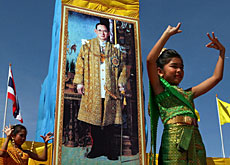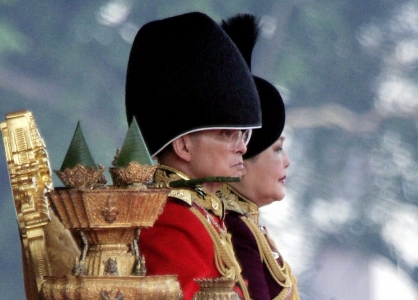Swiss gets ten years for insulting Thai king

A court in Thailand has sentenced a Swiss man to ten years in prison for defacing images of King Bhumibol.
The 57-year-old had faced a maximum of 75 years imprisonment under the country’s tough lèse-majesté laws.
The resident of Thailand was sentenced to 20 years in jail, but the judge halved the sentence in recognition of the fact he had pleaded guilty to the five counts of lèse majesté.
Lèse majesté – the crime of violating majesty, an offense against the dignity of a reigning sovereign or against a state – carries a penalty of three to 15 years in jail in Thailand.
This would have meant a maximum penality of 75 years for the five charges.
The Swiss was arrested in December in the northern city of Chiang Mai, where he has lived for ten years, after black paint was sprayed on five portraits of the 79-year-old king, the world’s longest-reigning monarch.
Police reports said the Swiss was drunk when the portraits were defaced on December 5, the king’s birthday and a national holiday.
The Swiss embassy in Thailand reacted with tempered criticism to the news.
“We respect the Thai justice system,” Jacques Lauer, deputy chief of mission at the embassy in Bangkok told the Associated Press, but added that it was a “tough” verdict.
No intervention
A Swiss foreign ministry spokesman was quoted as saying the authorities in Bern would not intervene.
“It is not the practice of the Swiss government to intervene with the legal authorities when the procedure conforms to basic legal principles,” said spokesman Jean Philippe Jeannerat, adding that Bern would wait until the proceedings had ended.
“Our compatriot was arrested on the basis of a clearly established legislation. He knows why he was arrested, he benefited from a counsel for the defence and he has the possibility to appeal,” he added.
Jeannerat said the Swiss man received consular assistance during his trial.
There was an accord between Switzerland and Thailand that allowed citizens to carry out their sentences in their countries of origin, but the crime in question was not covered by this, said Jeannerat.
He said the Swiss man had a month to appeal against his sentence.
Tough law
Other foreigners have fallen foul of the law occasionally, but jail terms are rare.
In 1994 a French businessman was arrested for insulting the monarchy during a Thai Airways flight from London with two members of the royal family on board. He was later acquitted.
King Bhumibol, who celebrated 60 years on the throne in June 2006, is revered as a champion of the poor and a pillar of stability during turbulent periods in Thailand’s coup-prone history.
Portraits of the king and queen adorn buildings across the country. Since his diamond jubilee, many Thais have taken to wearing yellow shirts, especially on Mondays, the colour associated with Monday, the day of his birth.
Legal experts have argued that it may be time to reform the lèse-majesté law, which they say is often abused during times of political turmoil.
swissinfo with agencies
4,000 Swiss live in Thailand.
150 Swiss firms do business in Thailand.
150,000 Swiss tourists visit Thailand every year.
Swiss exports to Thailand have trebled in the past decade to SFr934 million ($746 million).
Swiss imports from Thailand have almost doubled over the same period to SFr723 million.
Thailand is Switzerland’s second-largest trading partner in the region, after Singapore.
Switzerland is also well-known in Thailand since King Bhumipol spent seven years of his childhood in Switzerland.
Under the Swiss penal code, anyone who insults a foreign state as embodied by the head of state, its government, a diplomatic representative or official delegate meeting for a conference in Switzerland, can get a prison sentence of up to three years or a fine.
The same applies to international organisations based or meeting in Switzerland.
Anyone who willfully tears down, damages or publicly insults an official symbol of the country will be eligible for a prison sentence of three years or a fine.
In 2002 a rightwing Swiss parliamentarian raised objections about how the Swiss flag was depicted on the controversial cover of a US book on Switzerland during the Holocaust era. The government said there was no legal basis for action against the author as a private person.

In compliance with the JTI standards
More: SWI swissinfo.ch certified by the Journalism Trust Initiative


You can find an overview of ongoing debates with our journalists here. Please join us!
If you want to start a conversation about a topic raised in this article or want to report factual errors, email us at english@swissinfo.ch.